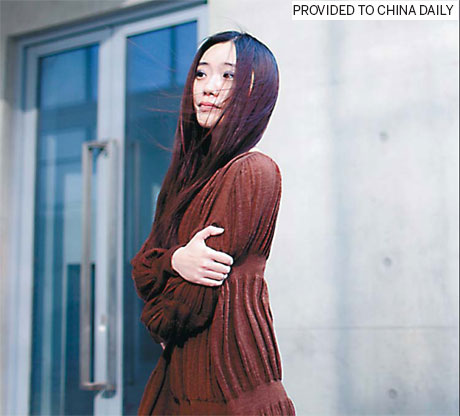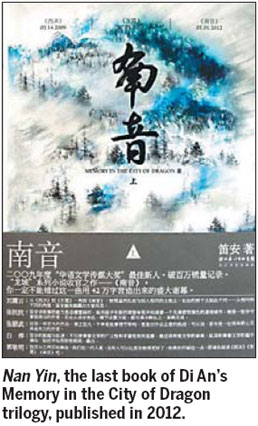
Popular young writer Di An has the pedigree to represent her generation as she emphasizes the individual rather than the group, according to Yang Guang.
Guo Jingming and Han Han have long been considered as representatives of the post-1980 writers, who emerged from the New Concept Writing Competition, an annual event initiated by Shanghai-based Mengya magazine in 1998. But Guo says the best representative of his generation of writers is neither Han nor himself, but 29-year-old Di An.
"Both of us have been engaged in many other businesses and are not pure writers anymore," he explains.
Guo is a successful businessman as he owns a culture company in Shanghai and serves as deputy chief editor of Changjiang Literature and Arts Publishing House; while Han has devoted much of his energy to being a professional rally driver and blogging.
Related: Guo Jingming: man of many parts
Over the years, post-1980 writers have prospered with their teen romances, despite criticism of lacking substance and literary value.
"What's outstanding about Di An is that she not only achieved market success but also won literary accolades," Guo says.
Born in Taiyuan, Shanxi province, Di An was born Li Di'an. She adopted the pen name Di An when she started publishing in 2003. This might also be seen as a gesture of independence from her renowned writer parents Li Rui and Jiang Yun.
With several sought-after novels and literary awards under her belt, Di An has perhaps surpassed her parents in terms of market influence. After her mother Jiang Yun delivered a speech on a literary seminar two years ago, she was addressed as "Di An's Mom" when taking questions from fans on Sina Weibo (China's Twitter).
Tall, slim, and well dressed, Di An deserves the nickname her fans have handed her - "Di the Pretty". Her signature innocent look, like a frightened deer, never fails to draw affection.
She received the following comments, when selected as the "promising young writer" by the Chinese Literature Media Awards judging panel in 2009:
"She has the ambition to master the Chinese language and represent the youth of her generation. Her writing is based on individual experience, but she always remembers to reflect how much of it was shaped by the value of her previous generation."
Di An agrees with this, adding the soul of post-1980 writers is their emphasis on individual experience, instead of collectives.
"Opinions might be divided regarding this concept of the enlarged individual, but for me it's unique and valuable," she says.
Her writing career has been smooth sailing from the start. Her debut novella, The Sisters' Jungle, was published as the headline piece in the prestigious Harvest literary magazine in 2003.
With the success of her Memory in the City of Dragon trilogy she became the country's youngest top-earning female writer, squeezing into the Chinese Writers' Rich List in 2010 and 2011.

But Di An says she took writing seriously only after the "wasteland-like loneliness" she felt in France.
After graduating from high school and studying history for a year at Shanxi University, she went to France in 2003 and returned with a master's degree in sociology, in 2010.
She remembers how she had to learn French like a babbling infant and how even the most trivial errands, such as filling an application form and paying the phone bill, became difficult for her because of the language barrier.
"Loneliness stimulates my desire to express, and writing gave me an outlet," she says. "If I hadn't studied overseas, perhaps I wouldn't have embarked on the journey of writing."
Perhaps it is in this sense that she wrote: "Writing is not part of my life, but the way to fight against it."
The creation of the Memory in the City of Dragon trilogy started from Zheng Nanyin, a character's name that occurred to her one gloomy afternoon in 2008 when she was waiting in the corridor for class to start.
She says the name conjured up in her mind the image of a cheerful teenage girl, and then the name was followed by three other names - Zheng Dongni, Zheng Xijue and Zheng Beibei.
The story develops around the coming-of-age of four cousins of the Zheng family, a large family in a fictional small town in Northwest China. Published in succession, from 2009 to 2012, the trilogy has sold more than 2 million copies.
Di An admits the influence of her writer parents.
"We had a lot of books at home and my mother used to read whatever she was reading to me."
"I have liked reading stories, listening to stories and telling stories from very young, and this almost inherent obsession with storytelling is my principal driving force to write."
Contact the writer at yangguang@chinadaily.com.cn.
|
|
|
|
|
|
|
|
